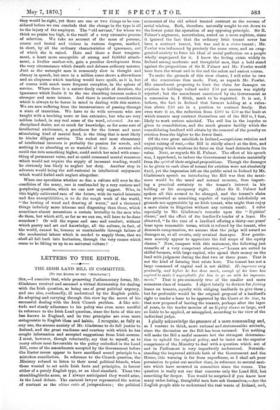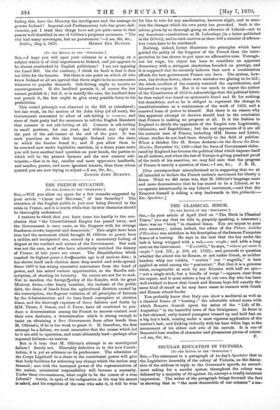LETTERS TO THE EDITOR.
THE IRISH LAND BILL IN COMMITTEE. (To TIM EDITOR. OF TUE "sem:Irma.?']
Sut,—I conceive that, while preserving Parliamentary forms, Mr.
• Gladstone received and assumed a virtual dictatorship for dealing -with the Irish question, as being one of great political urgency, -and one also, confessedly, ill understood by the English public. In adopting and carrying through this view lay the secret of his ,successful dealing with the Irish Church problem. A like atti- tude and steady adherence to his policy was even more needful in reference to the Irish Land question, since the facts of this are less known in England, and its true principles are even more antagonistic to English ideas and habits. I recognize, as fully as zany one, the sincere anxiety of Mr. Gladstone to do full justice to Ireland, and the great readiness and courtesy with which he has sought information and accepted suggestions from Irish sources. I must, however, though reluctantly, say that to myself, as to many others most favourable to the policy embodied in the Land Bill, some of the amendments accepted by the Government before the Easter recess appear to have sacrificed sound principle to a mistaken conciliation. In reference to the Church question, the Ministry refused to listen to their usual political friends, when these wanted to set aside Irish facts and principles, in favour either of a purely English type, or an ideal standard. These two stumblingbloeks arose, as I always anticipated they would arise, in the Land debate. The eminent lawyer represented the notion of contract as the ultima ratio of jurisprudence ; the political economist of the old school treated contract as the essence of social wisdom. Both, therefore, naturally sought to cut down to the lowest point the operation of any opposing principle. -Sir R. Palmer's argument, nevertheless, rested on a mere sophism, since it ignored the fact that the ordinary Irish tenant never has been a contract tenant, but was and is a status tenant ; Mr. Fowler was influenced by precisely the same error, and an exag- gerated anxiety to force his ideal of social perfection on a people wholly unprepared for it. I know the feeling exists widely in Ireland among moderate and thoughtful men, that a bold stand against the propositions of Sir R. Palmer and Mr. Fowler would have been the wisest and in the end the safest and easiest course.
To make the grounds of this view clearer, I will refer to two of the concessions thus made. First, as regards Mr. Fowler. His amendment proposing to limit the claim for damages on eviction to holdings valued under £50 per annum was rightly rejected ; but the amendment sanctioned by the Government as a concession is, I think, much to be regretted. It is not, I believe, the fact in Ireland that farmers holding at a valua- tion above £50 are in a position to contract freely. But even were it so, the reduction from £100 to £50 as the limit at which tenants may contract themselves out of the Bill is, I fear, likely to work serious mischief. The evil lies in the impulse so given to consolidation, and the much greater facility which the consolidating landlord will obtain by the removal of the penalty on eviction from the higher to the lower limit.
Of the two great mischiefs in Ireland,—capricious eviction and unjust raising of rent,—the Bill is chiefly aimed at the first, and everything which weakens its force on that head detracts from its value. Next, as regards Sir R. Palmer. The effect of his speech was, I apprehend, to induce the Government to deviate materially from the spirit of their original propositions. Though the damages to be given to each class of tenant for eviction were not absolutely fixed, yet the impression left on the public mind in Ireland by Mr. Gladstone's speech on introducing the Bill was that the maxi- mum would be the usual and normal measure, thus impart- ing a practical certainty to the tenant's interest in his holding or his occupancy right. After Sir It. Palmer had spoken all this seemed to be changed, and the tenant's claim was presented as something capable of varying indefinitely on grounds not appreciable by an Irish tenant, who might thus enjoy a mere claim to litigation without any certain result. I refer especially to Mr. Gladstone's remarks upon the " Equities' clause," and the effect of the landlord's tender of a lease. He observed, "In the case of a landlord offering a thirty-one years' lease upon reasonable terms, which is refused by the tenant, who demands compensation, we assume that the judge will award no damages or, at all events, only nominal damages. Now gentle- men scarcely appear to appreciate the full scope of the equity clauses." Now, compare with this statement, the following just remarks of a very competent observer,—" Leases are suited to skilful farmers, with large capital, who spend their money on the land with judgment during the first two or three years. That is not the kind of farming that exists here. The tenant has not a large command of capital and is not skilful. He improves very gradually, and before he has done much, enough of Ale lease has expired to make it unprofitable for him to go on with his improve- ments." That is pre-eminently true of the smaller and more numerous class of tenants. I object totally to devices for forcing leases on tenants, equally with obliging landlords to give them ; but far preferable would be the original proposal of a landlord's right to tender a lease to be approved by the Court at the time, to that now proposed of leaving the tenants, perhaps after the lapse of years, to the tender mercies of an Equity clause so large, and so liable to be applied, or misapplied, according to the view of the individual judge.
I gladly acknowledge the presence of a more commanding and, as I venture to think, more rational and statesmanlike attitude, since the discussion on the Bill has been resumed. Yet nothing will make the Bill a useful measure but the strongest determina- tion to uphold the original policy, and to insist on the superior competence of the Ministry to deal with a question which out of and in Parliament is very imperfectly understood. Notwith- standing the improved attitude both of the Government and the House, this warning is far from superfluous, as I shall ask your permission to point out another time, in reference to several mat-
ters which have occurred in committee since the recess. The question is really not one that concerns only the Land Bill, but something far deeper. You would be surprised if you knew how many order-loving, thoughtful men here ask themselves,—Are the English people able to understand the real wants of Ireland, and, failing this, have the Ministry the intelligence and the courage to govern Ireland ? Imperial and Parliamentary rule has grave defi- ciencies, yet I trust that things have not yet quite come to that pass so well described in one of Gibbon's pregnant sentences, "The city had many sovereigns, but no government."—I am, Sir, &c.,































 Previous page
Previous page